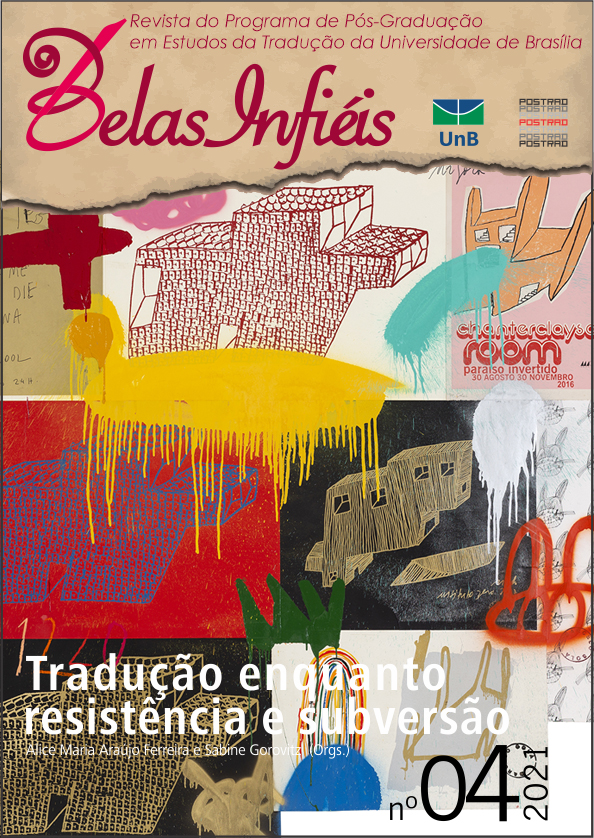Traduzir é resistir: Subversão e ateísmo como dispositivo de internacionalização da cultura brasileira
DOI :
https://doi.org/10.26512/belasinfieis.v10.n4.2021.34136Mots-clés :
Tradução e Resistência. Ateísmo. Internacionalização da literatura. Iracema. Macunaíma.Résumé
A resistência, a autonomia e a subversão da língua e da literatura no Brasil têm suas raízes no século XIX e se estendem no século XX, o que propiciou uma nacionalidade literária, uma independência cultural e literária, se demarcando da língua e literatura portuguesa da metrópole. Na primeira parte deste artigo, faço uma breve análise histórica da criação de uma língua (português do Brasil) dentro da língua (português da Metrópole) resistência às imposições literárias portuguesas a partir de dois exemplos de escritores brasileiros, José de Alencar e Mário de Andrade, e dos seus respectivos romances, Iracema e Macunaíma. E, na segunda parte, reflito sobre o lugar do Brasil literário no mapa mundial das literaturas a partir da teoria da multiplicação dos Mapas-Múndi de José Lambert e da teoria de Pascale Casanova sobre o parâmetro do Meridiano de Greenwich e das literaturas dominantes e dominadas assim como a questão do poder e da dominação das línguas-culturas. Toda argumentação se faz sob o prisma da tradução como meio de resistência ao poder hegemônico e como forma de ateísmo cultural.
Téléchargements
Références
Alencar, J. de. (1870). Iracema, (2ª edição). H. Garnier (Postscripto, pp. 241-268).
Alencar, J. de. (1959). Obra Completa. (v. 1). Aguilar.
Berman, A. (2013). A Tradução e a Letra ou o Albergue do Longínquo. (M. H. C. Torres, M. Furlan, & A. Guerini, Trans.). Editora Copiart.
Casanova, P. (2002). A república mundial das letras. (Marina Appenzeller, Trans.). Estação Liberdade.
Casanova, P. (2021). A língua mundial: tradução e dominação. (Marie-Hélène C. Torres, Trans.). EDUFSC/EDUnB.
Campos, H. (1992). Metalinguagem e outras metas. Perspectiva.
Granja, L. (2013). Rio-Paris: primórdios da publicação da Literatura Brasileira chez Garnier. Letras, 23(47), 81-95.
Hallewell, L. (2005). O livro no Brasil. (Maria da Penha Villalobos, Lólio Lourenço de Oliveira, Geraldo Gerson de Souza, Trans.). Edusp/T.A. Queiroz.
Lambert, J. (2011). Em busca dos mapas-múndi das literaturas (Walter Costa, Trans.). In A. Guerini, M. H. C. Torres, & W. Costa (Orgs.). Literatura & Tradução: Textos selecionados de José Lambert, (pp. 17-37). 7Letras.
Torres, M. H. C. (2014). Traduzir o Brasil Literário: história e crítica. PGET/UFSC & Copiart.
Téléchargements
Publié-e
Comment citer
Numéro
Rubrique
Licence
(c) Tous droits réservés CC BY 2021

Cette œuvre est sous licence Creative Commons Attribution 4.0 International.
Copyright Statement
Given the public access to this journal, the texts are free to use but requires the recognition of the original authorship and initial publication in this journal to be properly stated.
The journal allows the use of works published for non-commercial purposes, including the right to submit the work to publicly accessible databases. Published contributions are the sole and exclusive responsibility of the author(s).
- When submitting papers to be evaluated by the Belas Infiéis journal, the author(s):
- Declare that the contents of the contributions are original and of their original creation, being entirely responsible for their content if there is an objection by third parties.
- Claim to be aware that they should not commit academic plagiarism.
- Declare that the manuscript has not been published, completely or partially, in Portuguese or another language. If it is a translation it should be submitted to the Translated Articles section.
- Declare that the manuscript is not being evaluated by other journals.
- Declare that the manuscript was not submitted to another journal simultaneously.
- Commit(s) to inform the journal of any kind of error or inaccuracy in their contribution (published, in evaluation or in editing) and to collaborate with the editors to make due corrections of the article (when in evaluation or editing) or erratum/retraction (after publication).
- Declare that there is no conflict of interest regarding the published work.
- Authorize its release if it is accepted for publication without any kind of monetary compensation.
- Agree to assign non-exclusive rights to publication to the magazine, remaining free to make their contribution available in other media as long as the publication of the first version in Belas Infiéis magazine is mentioned. They also authorize Belas Infiéis to assign their texts for reproduction in content indexers, virtual libraries and similar platforms.
- Maintain copyright and grant the journal the right of first publication, the work being licensed under theCreative Commons Attribution License.
- Is/Are allowed and encouraged to publish and distribute their work online after the editorial process, which may increase the impact and citation of the published work.
- Authorize the editorial team to make textual adjustments and to adapt the article to the publication rules, when necessary.



















